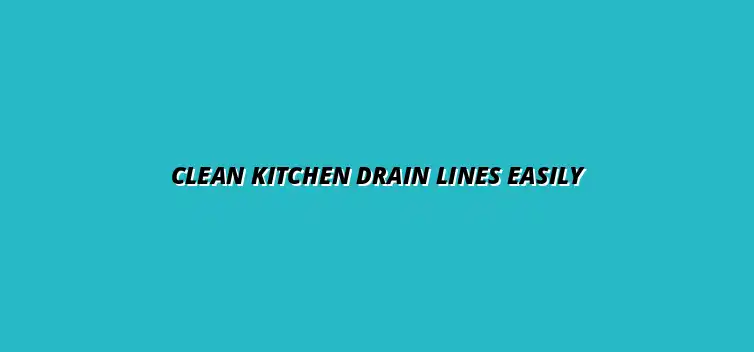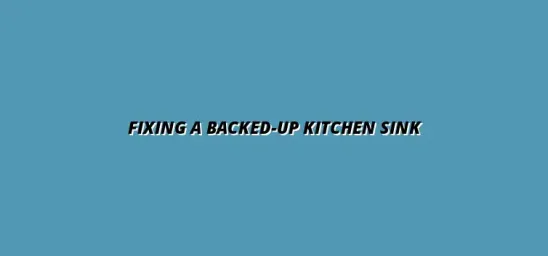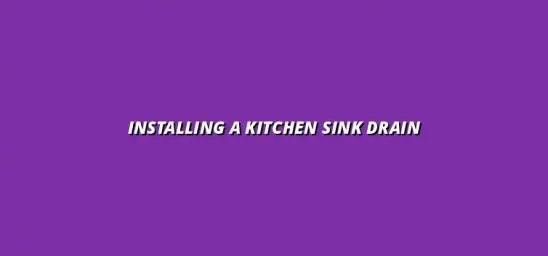
Clean Kitchen Drain Lines Easily
Understanding Kitchen Drain Lines and Their Maintenance
Kitchen drain lines are crucial for the smooth functioning of your home's plumbing system. They carry away waste and excess water from sinks, dishwashers, and other appliances. To ensure they operate effectively, regular maintenance is essential. Without it, you may encounter unpleasant surprises, such as clogs or even flooding!
Maintaining clean drain lines not only protects your home from potential water damage but also promotes a healthier kitchen environment. A little care can go a long way in avoiding costly repairs and keeping your kitchen fresh and inviting. For more tips on maintaining your entire kitchen plumbing system, check out these essential kitchen plumbing maintenance tips.
The Importance of Regular Kitchen Drain Line Cleaning
Cleaning your kitchen drain lines regularly offers numerous benefits that can enhance your home's functionality. One important advantage is the prevention of clogs and flooding, which can occur when debris accumulates over time. By staying proactive, you can save yourself from panic during important cooking moments!
- Reduces the risk of unexpected plumbing issues.
- Minimizes the chances of water backing up into your sinks.
- Helps maintain a smoother flow of water through your pipes.
Preventing Clogs and Flooding in Your Kitchen
Clogs can lead to significant disruptions in your kitchen, making it difficult to prepare meals or clean up afterward. Regular maintenance helps clear out any buildup of food particles, grease, or other debris before they become major blockages. It’s like giving your drains a little TLC!
By implementing a cleaning routine, you can effectively avoid flooding incidents, which can not only damage your kitchen but also your home's foundation. Remember, a clean drain is a happy drain! Learning how to prevent kitchen sink blockages easily is key to maintaining a smooth-running kitchen.
Enhancing Kitchen Hygiene and Odor Control
Another vital aspect of maintaining your kitchen drain lines is hygiene. Dirty drains can lead to unpleasant odors that linger in your cooking space. By keeping these lines clean, you reduce the chances of bacteria growth and foul smells, ensuring a more welcoming environment for family and guests.
Regular cleaning can help eliminate odors caused by trapped food and grease, making your kitchen a pleasant place to be. After all, no one wants to cook in a smelly kitchen! If you're looking for natural ways to unclog your drains, check out these tips for unclogging drains naturally.
Common Causes of Kitchen Drain Line Blockages
Understanding what causes blockages can help you take preventative measures and maintain your drains more effectively. Several common culprits can lead to clogged kitchen drains, so let’s explore them!
- Food particles: Leftover scraps can build up over time.
- Grease and oil: These substances can harden and create a thick sludge.
- Hard water deposits: Mineral buildup can significantly narrow the drain line.
Food Particles and Grease Buildup
Food particles from washing dishes can easily accumulate in your drain lines, especially if not rinsed properly. When combined with grease from cooking, these particles can form stubborn blockages that disrupt water flow. It’s essential to scrape plates before washing them to minimize this issue!
Additionally, grease can coat the insides of pipes and solidify, creating a thick barrier that traps more debris. Regular cleaning can help combat this buildup and keep your drains flowing freely. For more advice on tackling clogged sinks, see our guide on fixing a clogged kitchen sink.
Hard Water Deposits and Mineral Accumulation
Hard water can cause mineral deposits to accumulate inside your pipes, leading to decreased water flow and potential blockages. Over time, these deposits can create even bigger problems, requiring extensive cleaning or professional help. Preventative maintenance can make a big difference!
Using water softeners or descaling agents can help alleviate hard water issues in your kitchen. Being aware of these common causes is the first step in maintaining clear and healthy drain lines. Similar maintenance principles apply to bathroom drains; find helpful tips on bathroom drain maintenance.
Addressing Common Concerns About Kitchen Drain Maintenance
When it comes to kitchen drain maintenance, there are often many questions that pop up. Homeowners frequently seek clarity on what steps to take and how to ensure their drains stay clear. This section tackles some of the most common concerns and provides practical answers that can help everyone maintain their kitchen drains with confidence.
Understanding the right care for your kitchen drain lines can save you time, money, and a lot of headaches. By addressing FAQs and providing useful tips, you can keep your kitchen running smoothly. Let’s dive into the questions that matter most! Regular flushing can also help prevent issues, much like flushing your water heater prevents build-up.
FAQs on Kitchen Drain Line Cleaning
If you’re wondering how often you should be cleaning your kitchen drain lines, you’re not alone! This is a common question that can greatly impact the performance of your plumbing.
- How often should I clean my kitchen drain lines? Ideally, a thorough cleaning should be done every 3 to 6 months, depending on usage.
- What should I do if my drain line is still clogged? If regular cleaning doesn’t resolve the issue, consider using a plunger or drain snake, or contacting a plumbing professional for assistance.
- Are there signs that indicate my drain needs cleaning? Yes! Slow drainage, unpleasant odors, or gurgling sounds can all signal that it’s time for some maintenance.
How Often Should I Clean My Kitchen Drain Lines?
Regular drain cleaning helps prevent major blockages and maintains the overall health of your plumbing system. I recommend setting a reminder every few months to check on your drains. This proactive approach can save you from unexpected clogs and costly repairs.
Additionally, pay attention to factors that may increase the frequency needed for cleaning. For instance, if you cook often, the buildup of food particles may happen more quickly. Keeping a close eye on these details can make all the difference!
What Should I Do If My Drain Line is Still Clogged?
If you’ve tried cleaning your drain lines and still face issues, don’t worry! There are several methods you can try to clear the blockage.
- First, try using a plunger to dislodge the clog.
- If that doesn’t work, a drain snake can help reach deeper blockages.
- For persistent clogs, consider using a chemical drain cleaner, but always follow the instructions carefully.
If all else fails, it may be time to call in a professional plumber. They have the tools and expertise to tackle stubborn clogs effectively! For help with plumbing issues in Birmingham, consider contacting a plumber in Billesley, Birmingham.
Additional Tips for Long-Lasting Drain Line Health
Maintaining your kitchen drain lines isn’t just about cleaning; it’s also about taking preventative measures. There are simple steps you can take to enhance the longevity of your drains and keep them healthy.
- Using drain covers and screens can prevent food particles and debris from entering your drains.
- Regularly flushing your drains with hot water can help clear grease buildup.
- Consider scheduling professional cleanings annually to keep your drainage system in optimal condition.
Using Drain Covers and Screens
One of the easiest ways to prevent clogs is by using drain covers or screens. These handy tools catch food particles before they make their way into your pipes. Not only do they help keep your drains clear, but they also make cleanup a breeze!
Be sure to clean your drain covers regularly, as they can accumulate debris over time. A quick rinse under hot water should do the trick! It’s a simple step that can go a long way.
Understanding the Role of Professional Cleaning Services
Sometimes, a DIY approach isn’t enough. That’s when calling in a professional can be a wise decision. They have specialized equipment and expertise that can tackle even the toughest clogs.
Consider setting up annual appointments with a professional plumbing service. Investing in professional drain cleaning can ultimately save you money by preventing major plumbing issues down the line!
Final Thoughts on Maintaining Clean Kitchen Drain Lines
Taking care of your kitchen drain lines may seem like a chore, but it’s an important task that pays off in the long run. By being proactive and knowing when to seek help, you can keep your kitchen running smoothly!
Remember, a clean kitchen environment not only feels good but also creates a healthier space for you and your family. Embrace these tips, and you’ll notice the difference in your kitchen's performance!





Fixing a Backed-Up Kitchen Sink
Prepare Your Plumbing for Weather
Installing a Kitchen Sink Drain
When to Replace Plumbing Fixtures
Fixing a Jammed Garbage Disposal